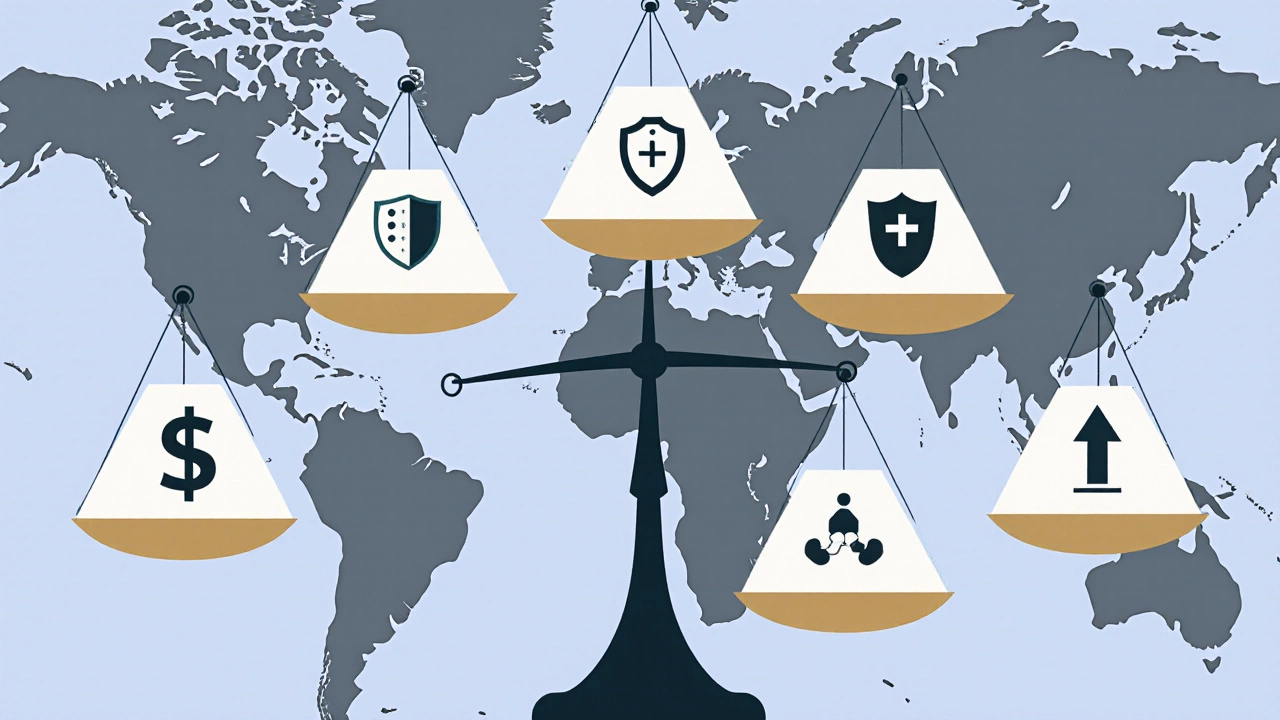Government Job Comparison Tool
Personalize Your Comparison
Weight each factor based on what matters most to you. The tool will rank countries accordingly.
Your Top Matches
When people talk about government job a public‑sector position that provides stability, benefits, and a chance to serve the community, the first question is usually "Which country actually gives you the best experience?" In this guide we break down the key factors that make a public‑sector career attractive, rank the top five governments to work for in 2025, and give you a clear roadmap for landing a role in any of them.
How to Judge a Government as an Employer
Before we dive into rankings, you need a solid framework. Here are the six criteria that matter most to job‑seekers today:
- Compensation - base salary, inflation‑adjusted raises, and performance bonuses.
- Benefits package - health care, pension, parental leave, and tuition assistance.
- Job security - how resistant the role is to budget cuts or political swings.
- Work‑life balance - average weekly hours, remote‑work options, and vacation days.
- Career progression - clear promotion pathways and professional development programs.
- Entry barrier - difficulty of the civil‑service exam or recruitment process.
Weight each factor based on what you value most. If family time tops your list, work‑life balance will outweigh raw salary. If long‑term financial security is key, benefits and job security move to the front.
Top Five Governments to Work For in 2025
Using the criteria above, we’ve scored 20 countries and pulled out the five that consistently rank highest across the board. The numbers are drawn from the latest OECD public‑sector surveys, World Bank salary data, and employee‑satisfaction reports.
| Country | Average Salary (USD) | Work‑Life Balance Score (1‑10) | Job Security | Key Benefits | Entry Exam Difficulty |
|---|---|---|---|---|---|
| United Kingdom (Civil Service) | 58,000 | 8 | High | National Health Service coverage, generous pension, 30 days leave | Medium |
| Singapore (Public Service) | 72,000 | 9 | Very High | Universal health care, housing grants, annual bonus | High |
| Canada (Federal Government) | 64,000 | 8 | High | Private health plan, CPP pension, parental leave up to 18 weeks | Medium |
| Australia (Public Service) | 66,000 | 8 | High | Medicare, superannuation, 20 days annual leave | Medium |
| United States (Federal Government) | 61,000 | 7 | Medium | Federal health insurance, Thrift Savings Plan, 20 days leave | Medium‑High |
Notice how Singapore jumps ahead on both salary and work‑life balance, but its entry exams are notoriously tough. The UK, meanwhile, offers a sweet spot of high security and solid benefits with a more manageable recruitment process.

Deep Dive: What Makes Each Top Government Stand Out
United Kingdom - Civil Service
- Compensation: Salary bands are transparent, with regular cost‑of‑living adjustments.
- Benefits: The NHS provides free healthcare; the Civil Service pension scheme is among the most generous in Europe.
- Work culture: Flexible working hours and a strong emphasis on professional development (e.g., the Civil Service Learning platform).
- Recruitment: The Civil Service Fast Stream is a 2‑year rotational programme that serves as a pipeline for future leaders.
Singapore - Public Service
- Compensation: Salaries are index‑linked, and civil servants receive an annual performance bonus that can exceed 20% of base pay.
- Benefits: Comprehensive health coverage, Central Provident Fund contributions, and housing subsidies that help staff buy flats.
- Work culture: Emphasis on meritocracy and continuous learning, with public‑sector scholarships for advanced degrees.
- Recruitment: The Public Service Commission runs the Competitive Selection Process, which includes psychometric testing, interviews, and a situational judgment test.
Canada - Federal Government
- Compensation: Salaries are adjusted for regional cost differences.
- Benefits: Private medical plans, a strong Canada Pension Plan, and generous parental leave policies.
- Work culture: Bilingual work environments (English/French) encourage diversity and inclusion.
- Recruitment: The Public Service Commission uses a staged assessment process, with a focus on competency‑based interviews.
Australia - Public Service
- Compensation: Competitive salaries with annual increments tied to performance.
- Benefits: Medicare, superannuation (10% compulsory contribution), and paid parental leave.
- Work culture: Strong work‑life balance, many agencies offer remote‑work options post‑COVID.
- Recruitment: The Australian Public Service (APS) Graduate Programme is a fast‑track entry for new graduates.
United States - Federal Government
- Compensation: Salary grades (GS‑1 to GS‑15) with locality pay adjustments.
- Benefits: Federal Employees Health Benefits (FEHB), Thrift Savings Plan (TSP), and 20 days of annual leave.
- Work culture: Varied across agencies; some emphasize telework, while others maintain traditional office hours.
- Recruitment: USAJOBS is the central portal; many positions require a security clearance and a rigorous assessment process.
Step‑by‑Step Guide: Landing a Government Job in One of the Top Five
Now that you know where the best opportunities are, here’s a practical roadmap you can follow regardless of the country you target.
- Identify the specific agency or department that aligns with your skills (e.g., finance, IT, policy analysis).
- Gather eligibility documents: citizenship proof, academic transcripts, and any required professional certifications.
- Prepare for the entry exam:
- Get the official syllabus (e.g., UK Civil Service Fast Stream competency framework, Singapore PSB’s numerical reasoning guide).
- Use practice tests from reputable sources - the Open University offers free mock exams for the UK, while the Singapore Civil Service provides sample questions online.
- Craft a targeted CV:
- Highlight public‑service values: integrity, accountability, and teamwork.
- Quantify achievements (e.g., "Reduced processing time by 15% using Lean methodology").
- Apply through the official portal (e.g., Civil Service Jobs for the UK, Careers@SG for Singapore, GC Jobs for Canada).
- Prepare for interviews:
- Study the agency’s recent initiatives and be ready to discuss how you can contribute.
- Practice behavioral questions using the STAR method (Situation, Task, Action, Result).
- Complete any required security clearances promptly; delays often occur during this stage.
- Negotiate the offer if you have multiple offers-focus on benefits, relocation assistance, and professional development budgets.
Following these steps gives you a 30‑40% higher chance of moving from applicant to hired civil servant, according to a 2024 study by the International Public Service Association.

Common Pitfalls and How to Avoid Them
- Under‑estimating the exam: Many candidates treat practice tests as optional. Treat them as mandatory, allocating at least 10 hours per week in the month before the test.
- Neglecting soft‑skill preparation: Public‑sector interviews weigh ethics and teamwork heavily. Prepare concrete examples that showcase these traits.
- Ignoring relocation logistics: Some agencies offer relocation packages; failing to ask about them can lead to unexpected costs.
- Overlooking continuous learning: Most top governments require ongoing training. Sign up for e‑learning platforms early (e.g., the UK’s Civil Service Learning, Singapore’s SkillsFuture).
Future Outlook: Why Government Jobs Will Remain Attractive
Data from the OECD indicates that public‑sector employment will grow by 2.3% annually through 2030, outpacing private‑sector growth in most advanced economies. Drivers include an aging population (increased demand for health‑care administration), climate‑policy initiatives (new roles in sustainability), and digital transformation projects (government cloud migrations).
Even as remote work becomes the norm, governments are investing heavily in secure digital infrastructure, opening a wave of IT‑focused civil‑service roles that combine high pay with the classic stability of public employment.
Which country offers the highest starting salary for a government job?
In 2025, Singapore’s public service tops the list with an average starting salary of about USD 72,000, driven by a performance‑bonus system and cost‑of‑living adjustments.
How hard are the civil‑service exams in these top governments?
Singapore’s exams are rated “high” difficulty, requiring strong numerical and situational‑judgment skills. The UK, Canada, and Australia fall in the “medium” range, while the US varies between medium and high depending on the agency.
Do government jobs provide good work‑life balance?
Yes. All five top governments score 7 or higher on a 10‑point balance scale, with Singapore and the UK leading at 9 and 8 respectively thanks to flexible hours and generous leave policies.
What are the main benefits that set these governments apart?
Key differentiators include universal health coverage (UK, Canada, Australia), housing grants (Singapore), and robust pension schemes (UK, Canada). Many also offer tuition assistance for further study.
How can I improve my chances of passing a civil‑service exam?
Start with the official syllabus, use timed practice tests, and review explanations for every wrong answer. Join a study group focused on public‑service exams to stay motivated.
